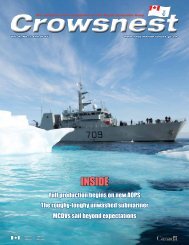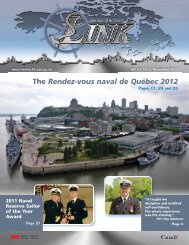Create successful ePaper yourself
Turn your PDF publications into a flip-book with our unique Google optimized e-Paper software.
3.4.1 Chokepoints<br />
<strong>The</strong> existence <strong>of</strong> maritime chokepoints—<strong>the</strong> Strait <strong>of</strong> Gibraltar, <strong>the</strong> Straits <strong>of</strong> Malacca, Singapore,<br />
Bab al-M<strong>and</strong>ab, <strong>the</strong> Suez Canal, <strong>the</strong> Turkish Straits, <strong>the</strong> Straits <strong>of</strong> Hormuz, <strong>the</strong> Greenl<strong>and</strong>-Icel<strong>and</strong>,<br />
United Kingdom (GIUK) Gap <strong>and</strong> <strong>the</strong> Panama Canal—has always been important in <strong>the</strong> strategic<br />
calculations <strong>of</strong> maritime <strong>Power</strong>s. Closures <strong>of</strong> such important waterways, however, have generally<br />
only ever happened in wartime when one combatant <strong>Power</strong> prevented ano<strong>the</strong>r from using an<br />
important waterway (e.g., Gibraltar <strong>and</strong> <strong>the</strong> Suez Canal in <strong>the</strong> Second World War). 122 In <strong>the</strong><br />
globalised world economy, such waterways have become ever more important for <strong>the</strong>ir<br />
contribution to shipping routes. Today, for example, 30 percent <strong>of</strong> all trade passes <strong>and</strong> 80 percent<br />
<strong>of</strong> all China’s <strong>and</strong> Japan’s oil imports move through <strong>the</strong> Straits <strong>of</strong> Malacca. 123 <strong>The</strong> viability <strong>of</strong> at<br />
least two <strong>of</strong> <strong>the</strong> largest economies is, <strong>the</strong>refore, dependent on unrestricted passage through a<br />
narrow channel <strong>of</strong> seawater.<br />
<strong>The</strong> location <strong>of</strong> many <strong>of</strong> <strong>the</strong> chokepoints is a significant maritime consideration. Some are found<br />
in areas where political instability is <strong>the</strong> norm, or where <strong>the</strong> possibility <strong>of</strong> armed conflict is real.<br />
In <strong>the</strong> case <strong>of</strong> <strong>the</strong> Straits <strong>of</strong> Malacca, <strong>the</strong> waterway is relatively shallow that at some points<br />
requires regular dredging—with <strong>the</strong> consequence that natural or man-made obstruction is, if not<br />
likely, at least made easier should <strong>the</strong>re ever be an intent to do so. 124 More generally, restricted or<br />
blocked access to any maritime chokepoint would impact <strong>the</strong> global economy, particularly with<br />
regard to <strong>the</strong> trade in energy resources. 125 Even <strong>the</strong> threat <strong>of</strong> a blockage can have a cascading<br />
impact on global markets, as happened in 2011 when Iran threatened to block <strong>the</strong> Straits <strong>of</strong><br />
Hormuz to dissuade <strong>the</strong> EU from imposing economic sanctions. 126 Such an action would likely<br />
call forth a strong (perhaps an armed) response from <strong>the</strong> traditional maritime <strong>Power</strong>s, as well as a<br />
growing number <strong>of</strong> countries whose economies are dependent on maritime trade.<br />
3.4.2 Ports as Hubs<br />
One author has written that “[b]ecause <strong>of</strong> <strong>the</strong>ir function <strong>and</strong> strategic locations, <strong>the</strong> viability <strong>and</strong><br />
productiveness <strong>of</strong> ports can have a significant economic impact on <strong>the</strong>ir surrounding region.” 127<br />
<strong>The</strong> largest ports have been transformed by globalisation into critical maritime infrastructure for<br />
<strong>the</strong> world economy. <strong>The</strong>y have become hubs in a worldwide supply chain. One study <strong>of</strong> global<br />
ship movements noted in this regard that “[t]here are a few large, highly connected ports through<br />
which all smaller ports transact <strong>the</strong>ir trade.” 128 And <strong>the</strong> links might not be so obvious. More than<br />
50 percent <strong>of</strong> <strong>the</strong> containers arriving in Montreal is coming to or leaving <strong>the</strong> US market; <strong>and</strong><br />
much <strong>of</strong> what arrives in Prince Rupert, British Columbia, is destined for <strong>the</strong> US via <strong>the</strong><br />
122 Rodrigue, <strong>The</strong> Geography <strong>of</strong> Transport Systems (3 rd ed), p. 32.<br />
123 Ray Griggs, “A <strong>Maritime</strong> School <strong>of</strong> Strategic Thought for Australia”, in Justin Jones (ed.), A <strong>Maritime</strong><br />
School <strong>of</strong> Strategic Thought for Australia (Sea<strong>Power</strong> Centre: Canberra, Australia, 2013), p. 14.<br />
124 Rodrigue, <strong>The</strong> Geography <strong>of</strong> Transport Systems (3 rd ed), p. 38.<br />
125 See Charles Emmerson <strong>and</strong> Paul Stevens, “<strong>Maritime</strong> Choke Points <strong>and</strong> <strong>the</strong> Global Energy System”,<br />
Chatham House Briefing Paper, January 2012.<br />
126 David Blair, “Iran threatens to close Strait <strong>of</strong> Hormuz over EU oil sanctions”, <strong>The</strong> Daily Telegraph,<br />
23 January 2012.<br />
127 Michael C. Ircha, “Ports <strong>and</strong> Shipping Security”, Proceedings, 46 th Canadian Transportation Research<br />
Forum, Gatineau, June 2011 [accessed on 17 July 2014 at<br />
www.ctrf.ca/conferences/2011Gatineau/2011Proceedings/11IrchaPortSecurity.pdf], p. 2.<br />
128 Kaluza et al., “<strong>The</strong> complex network <strong>of</strong> global cargo ship movements”, p. 1095.<br />
DRDC-RDDC-2016-R085 27




